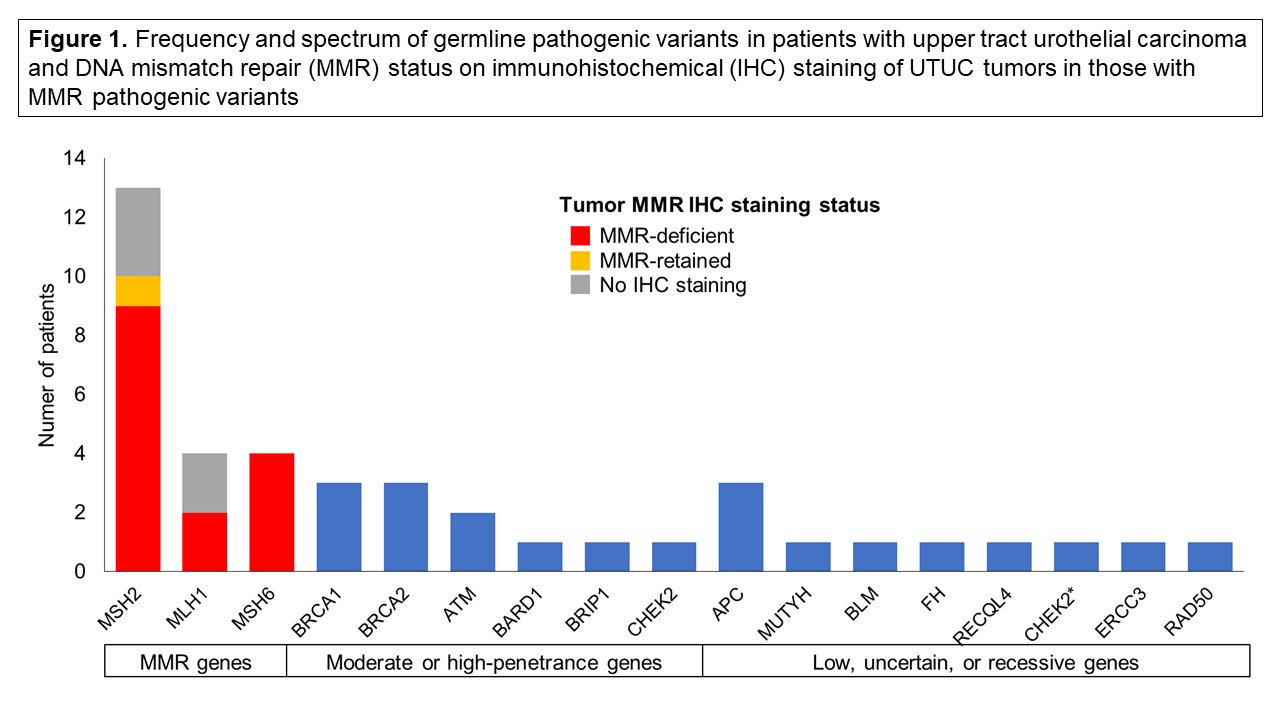Back
Poster, Podium & Video Sessions
Podium
PD58: Bladder Cancer: Upper Tract Transitional Cell Carcinoma II
PD58-01: Prevalence and Spectrum of Germline Mutations in Patients with Upper Tract Urothelial Carcinoma
Monday, May 16, 2022
1:00 PM – 1:10 PM
Location: Room 252
Hong Truong*, Rania Sheikh, Yelena Kemel, Manuel Jesus Escano, Andrew Lenis, Peter Reisz, Alvin Goh, Eugene Cha, Bernard Bochner, Maria Carlo, Hikmat Al-Ahmadie, Jonathan Coleman, New York, NY

Hong Truong, MD, MS
Memorial Sloan Kettering Cancer Center
Podium Presenter(s)
Introduction: Deleterious germline mutations confer high cancer risks and require enhanced cancer screening, yet the prevalence and spectrum of germline mutations among patients with upper tract urothelial carcinoma (UTUC) are unknown. We sought to determine the frequency of germline mutations in cancer susceptibility genes in patients with UTUC and identify clinical and pathologic factors associated with the presence of germline mutations in DNA mismatch repair (MMR) genes.
Methods: We retrospectively reviewed patients with UTUC who underwent germline sequencing with a targeted panel of >75 cancer-associated genes as part of an institutional protocol of matched tumor-germline sequencing initiative from 04/2015 to 04/2021. Prevalence and spectrum of pathogenic/likely pathogenic variants were determined. Clinicopathologic characteristics were assessed by mutation status. All statistical computations were performed using STATA version 12.1
Results: Of 232 patients, 70% were male, 85% had high grade UTUC, 12% had bilateral tumors, and 11% had metastasis at diagnosis. Germline mutations were identified in 37 (16%) patients. 21 (9%) had mutations in Lynch syndrome (LS) associated MMR genes (13 MSH2, 4 MSH6, 4 MLH1) and 11 (5%) had mutations in moderate/high penetrance non-MMR genes (3 BRCA1, 3 BRCA2, 2 ATM, 1 BARD, 1 BRIP1, and 1 CHEK2).
In 21 patients with MMR mutations, 3 (14%) had bilateral UTUC, 10 (48%) and 15 (71%) had personal and family history of LS-associated cancers, respectively. Only 10 (48%) of patients with MMR mutations met current NCCN guideline for genetic testing. UTUC tumor analyses of patients with MMR mutations revealed 15/16 (94%) had MMR-deficiency, and 12/18 (67%) had microsatellite instability.
Conclusions: In our cohort of patients with UTUC identified to have pathogenic germline variants in MMR gene, half did not qualify for germline testing based on current genetic guideline for Lynch syndrome. Importantly, most patients with MMR mutations had microsatellite unstable or MMR-deficient UTUC tumors which would qualify patients for immunotherapy. Our findings support germline testing, especially for MMR genes, for all patients with UTUC.
Source of Funding: NIH T32 Ruth L. Kirschstein National Research Service Award 2020 - 2022

Methods: We retrospectively reviewed patients with UTUC who underwent germline sequencing with a targeted panel of >75 cancer-associated genes as part of an institutional protocol of matched tumor-germline sequencing initiative from 04/2015 to 04/2021. Prevalence and spectrum of pathogenic/likely pathogenic variants were determined. Clinicopathologic characteristics were assessed by mutation status. All statistical computations were performed using STATA version 12.1
Results: Of 232 patients, 70% were male, 85% had high grade UTUC, 12% had bilateral tumors, and 11% had metastasis at diagnosis. Germline mutations were identified in 37 (16%) patients. 21 (9%) had mutations in Lynch syndrome (LS) associated MMR genes (13 MSH2, 4 MSH6, 4 MLH1) and 11 (5%) had mutations in moderate/high penetrance non-MMR genes (3 BRCA1, 3 BRCA2, 2 ATM, 1 BARD, 1 BRIP1, and 1 CHEK2).
In 21 patients with MMR mutations, 3 (14%) had bilateral UTUC, 10 (48%) and 15 (71%) had personal and family history of LS-associated cancers, respectively. Only 10 (48%) of patients with MMR mutations met current NCCN guideline for genetic testing. UTUC tumor analyses of patients with MMR mutations revealed 15/16 (94%) had MMR-deficiency, and 12/18 (67%) had microsatellite instability.
Conclusions: In our cohort of patients with UTUC identified to have pathogenic germline variants in MMR gene, half did not qualify for germline testing based on current genetic guideline for Lynch syndrome. Importantly, most patients with MMR mutations had microsatellite unstable or MMR-deficient UTUC tumors which would qualify patients for immunotherapy. Our findings support germline testing, especially for MMR genes, for all patients with UTUC.
Source of Funding: NIH T32 Ruth L. Kirschstein National Research Service Award 2020 - 2022


.jpg)
.jpg)